It is hard to imagine a mobile phone owner who hasn’t come across any phone scams. Fraudsters have different ways of accessing phone number databases, and there are thousands of different stories and schemes they use to get. Thus, if you are a mobile phone user (which you obviously are if you are here), it is important to know how to identify a scammer and what to do if you have been scammed over the phone. Lucky for you, the GEOfinder team is a beast when it comes to mobile phone number security (almost a decade in the industry), so we will tell you everything you need to know about phone scams.
What Are Telephone Scams?
As simple as it is, telephone scams are a type of fraud in which cheaters contact people via the phone with the aim of getting their money or personal data. British communication services regulator Ofcom states that only in the UK, every 8 out of 10 people receive scam calls or messages at least once a month. Australian scam monitoring agency reports that of all scams that have taken place in 2024, 36% are text message scams, and 17% are phone call scams. Considering that they count only the reported cases when people actually lost money, the real numbers are much higher.
Thus, telephone scams are a very popular and, unfortunately, effective type of fraud, which has become even more diverse with the popularization of SMS messages. Although there is an opinion that teenagers and older people are more likely to become victims of phone scammers, the Daily Mail provides statistics showing that the percentage is around 50% for all age groups. Thus, no matter how old or tech-savvy you are, you must be aware of different types of phone scams and know what to do if you feel something is wrong with the call or SMS you have received.
Different Types of Scam Calls
Phone scammers have neverending fantasy and no conscience, so they constantly come up with new ideas for cheating good people for their money. The list here is actual for 2024, but if you are reading it for the future, chances are that new types of scams have already been invented and could be included here.
Free Vocation or Prize
One of the most popular phone scams is offering something for free. People get extremely excited and cannot think properly when, at the end of a hard-working day, they get a phone call or message saying that they have won a Caribbean cruise or got a lottery prize for $10,000. There is always a small but, though. To claim the win, people are requested to pay a tiny amount of $100 as a transaction fee or $500 as an administrative fee to prepare all the documents for their cruise. Phone scammers disappear as soon as they get the money, and the winners can only cry about their broken dreams and lost cash.
How can you avoid becoming a victim of this scam? The red flag here is the request to send scammers money for any possible reason. If you have won a lottery – you will pay the taxes, of course, but you will never be requested to pay anything to get your win. Thus, whenever you hear, “You need to pay us…” – end the call and start searching for how to report a scam call.
Phone Phishing

Phishing is more common for e-mails, but it can also happen via the phone. It is hard to track all scam call numbers, so people often become victims of such fraudsters, especially those who are not into computers and other digital stuff.
Here, scammers usually call people and say that they are from ISP office/Windows, Google, FBI, or any other serious organization connected to the digital sphere or safety. They usually claim that the person’s computer or phone is in danger, it may be affected by malicious malware, and to remove it, they need the owner’s e-mail, password, bank card number, birth date of their grandmother, basically, anything that comes to the scammers’ heads. Whenever they reach their aim, they disappear and start using the acquired information for their profits as soon as possible.
How can you avoid becoming a victim of this scam? Remember that no one from the FBI, Microsoft, or any other similar organization would call you to warn about malicious software or breaches on your device and ask you for your personal details and passwords. End the call immediately as soon as you hear something like this.
Scams Involving Loans
Loan phone scams are similar to phishing in that they are mostly focused on getting your personal details. In fact, it is one of the easiest ways how to identify a scammer: They ask you for your password, date of birth, card number, answers to secret questions you use on registration, etc.
Loan scammers try to excite people with generous loan offers with low interest rates, but their main aim is to make you fill out the form with your personal information or even tell them everything they need while they are filling out the form for you. They play on people’s greed and desire to get easy money, but in fact, they make easy money themselves.
How can you avoid becoming a victim of this scam? The golden rule is never to give your personal information to anyone over the phone. Banks usually send authentication requests via banking apps, and many other services use one-time passwords. Everyone who offers you easy money and asks to provide information about yourself without any security procedures is a scammer.
Fake Debt Collectors

These bastards play on people’s fear instead of greed. Such phone scams often begin in an aggressive manner, with the scammer arguing and scaring people by saying they are debt collectors and what can happen to the victim if they do not pay the debt or provide information about the creditor they are looking for.
The best solution in such a situation is to stay cool and ask the person on the other side of the line their name, the company they work for, the phone number, etc. Scammers often become even more aggressive in such situations and try to push even more; in this case, you can simply end the call. If they have provided the company information – end the conversation and check it on Google, then proceed with the scam reporting.
How can you avoid becoming a victim of this scam? Always stay cool, ask for details, and do not let scammers put you in fear. If you have no debts – simply ignore them and end the call as soon as you understand what it is about.
Charities Scams
Charity phone scams are aimed at people’s compassion. Who can resist when they get contacted by the orphanage charity fund collecting donations to buy winter clothes for children? You may donate any sum you want, and you will never even know that it was used as intended.
How can you avoid becoming a victim of this scam? All official charity organizations should be registered and have a registration number, address, and official representative. If you are contacted by someone asking you to donate to a charity, ask them for the details, check the foundation they mention on the internet, and review what other people write about it.
Scams Targeted at People with Medical Problems
Most phone scams aimed at people with medical problems involve phishing for personal information. They often offer new and updated medical care programs and invite people to free labs and examinations, but in order to register for them, they request to provide personal information.
How can you avoid becoming a victim of this scam? If you do not expect your medical care plan to be improved, have never registered or been to the “hospital” scammers are calling from, and generally do not understand what people on the other side of the line are talking about – end the conversation. Do not even ask yourself, ‘is it a scam number?’
Threatening with Warrants
How would a person feel when they get a call stating that a warrant has been issued for their arrest and the officials are already on the way? Terrified. And they will happily pay all the fines just to avoid this. However, think, why would the police call you to inform you that they are on their way to arrest you? To let you escape? No, it is obviously one of the threatening phone scams.
How can you avoid becoming a victim of this scam? If you are sure you haven’t broken the law – do not let anyone make you hesitate and think, “What if?” You are innocent, so end the call and forget about the threats.
How to Identify a Scammer?
The main thing to remember on how to identify a scammer is that they always need something from you. If you get a call where someone tells you that you need to pay money, provide your personal information, provide someone’s personal information, fill out any forms, etc., it is likely a scammer.
Another good thing is to check ‘is this a scam number?’ on corresponding resources. People often report scam numbers, share information with each other, and warn everyone on the internet and forums. Thus, checking the number you got a call from on Google sounds like a good idea. Now, the main question: What to do if you have been scammed over the phone?
Where and How to Report Scam Calls?
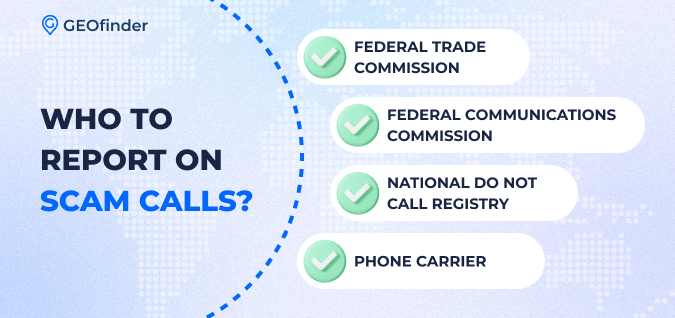
How to report a scam call is a question people often ask when they come across this problem. There are a lot of organizations you can contact. We will mention the ones for the USA here, and if you live in another country, you can simply find their local analogs.
- Federal Trade Commission. Visit the Federal Trade Commission’s website and complete the report for the phone calls.
- Federal Communications Commission. Like with FTC, visit its website and fill out the File a Complaint form.
- National Do Not Call Registry. They have a special form for reporting unwanted calls. You need to provide the scam call numbers and a short summary.
- Phone Carrier. Many phone carriers have hotlines to report scam calls. Check if this is the case with yours, and do not hesitate to use it.
Report all phone scams you come across, it will help minimize the amount of phone fraud and increase overall safety.
How to Protect Yourself from Phone Scammers?
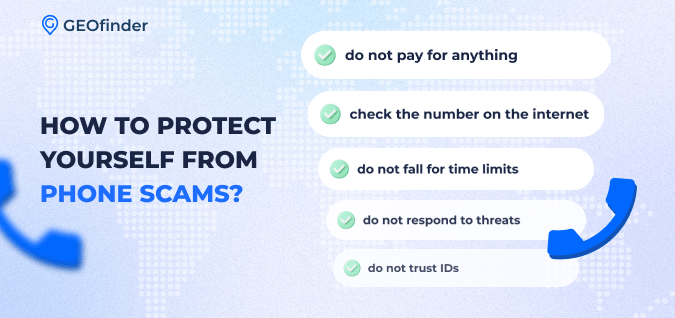
Most scammers obtain phone numbers from unsecured websites, including those that offer location tracking services. If you are looking to track someone’s location, it’s crucial to use a reliable and secure platform. One such trusted service is GEOfinder, which ensures your personal data is safe while providing accurate location tracking. Avoid using unverified sites that could expose your phone number to scammers.
Protection from scam calls is, of course, everyone’s personal responsibility, but still, there are some general tips you can use to ensure that you are a less attractive victim of phone scammers than those who do not follow them.
Never Pay for Anything
Scammers often ask for small, unsubstantial fees to get “wins” or “prizes”, and people often fall for it. Of course, if you are told that you have won $10,000, it is not a big deal to pay $100-$200 to get the money, right? Not right. It is a scam, and all offers where you need to pay to get something offered to you are phone scams, too.
Check Forums and Threads
Scam phone numbers are used multiple times, so if you get suspicious about the caller, feel free to check it on Google and look through the forums during the call. You can usually find information in seconds if it has already been reported as one of the scam phone numbers.
Do Not Fall for the “Urgent” Trick
Phone scams are often very “urgent”: limited availability, as soon as possible, until tomorrow, during the next hour. Scammers do not want to give you time to think; they also want their person to feel exclusive for getting such a unique offer. You should always stay cool and get alerted as soon as you hear that sending someone money to get your free Caribbean cruise is super urgent.
Ignore Threats
Remember, no one has the right to threaten you. Do not even ask yourself the question, ‘is this a scam number?’, if you hear threats. End the call immediately and report it to the corresponding organizations.
Do Not Trust IDs
Phone scams are possible because they are impersonal, and it is hard to check the information you get from the scammer. Do they say they work for the FBI? Well, how can you check it quickly during the conversation? You better not trust any information you cannot check immediately by default.
Conclusion
Phone scams are a popular type of fraud nowadays as almost everyone has a cell phone and, as a consequence, can be easily accessed almost 24/7. It is hard to check the speaker’s identity on the phone, so people often get misled and pay the money requested and share their personal information. Remember, never pay or give your data to anyone on the phone and do not forget to report scam calls. One final tip—use reliable location tracking services to avoid falling into untrustworthy traps.


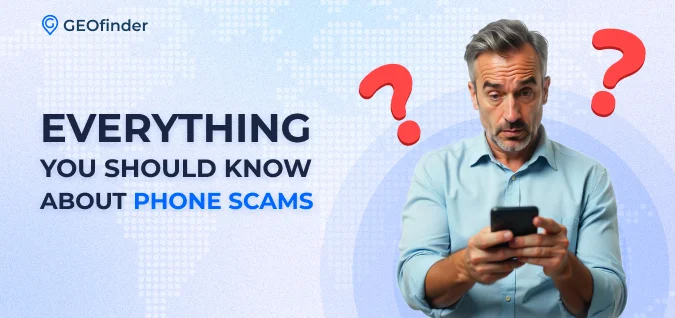
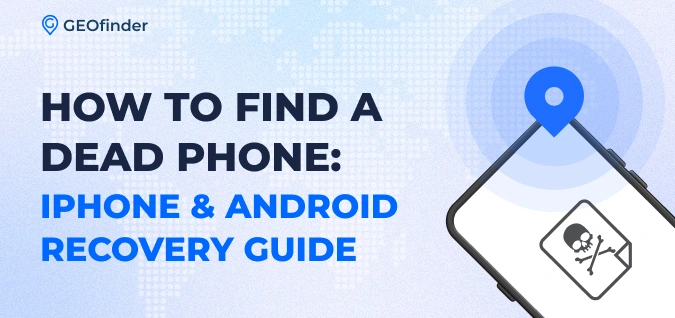
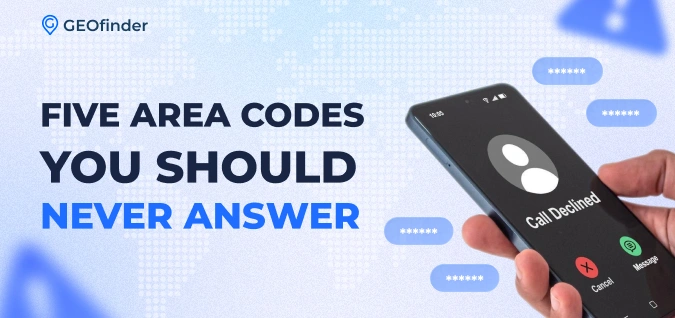

Comments